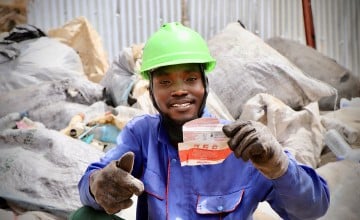
Read our 2024 annual report

Knowledge Hub
Turning litter into building blocks in Chad

A pilot project run in Chad by the Irish humanitarian organisation, Concern Worldwide, is turning waste packaging from emergency therapeutic food into solid bricks for use in construction.
A pilot project run in Chad by the Irish humanitarian organisation, Concern Worldwide, is turning waste packaging from emergency therapeutic food into solid bricks for use in construction.
Ready-to-Use-Therapeutic-Food (RUTF) is a life-saving foodused to treat children with malnutrition. However, the packaging, made from a variety of materials including aluminium and plastic, is discarded around the countryside, becoming litter due to a lack of waste disposal facilities.
Concern worked with a local Chadian company, Karö Enterprise, to collect over 59kg of packaging (approx. 12,800 empty packages) to recycle into 600 bricks and paving stones for use in construction.
“We wanted to do something to reduce the litter and pollution that was being caused by the red and white RUTF food packaging that ended up across the land and environment. Working with the local community and the people we support, we came up with a way to encourage them to return the packaging,” said Clémence Eberschweiler, Country Director with Concern in Chad.
“While it was a pilot project, the positive outcomes and reduction in litter show that small changes can make a huge difference, and we look forward to using these bricks in our own infrastructure projects in the future.”
The pilot was implemented in three districts around Lake Chad where Concern, and its partner International Rescue Committee (IRC), are working to reduce and treat acute malnutrition with humanitarian funding from the European Union.
In 2023 at the start of the three-year HAYAT programme - meaning 'life' in the local language -15.7% of the population around Lake Chad were acutely malnourished. A year later that number had reduced to 10%.
Acute malnutrition is typically caused by not having enough to eat and is most common in children. It weakens the immune system, leaving children at high risk of dying from common childhood illnesses as well as from malnutrition itself.
So far, the HAYAT programme has directly reached 60,000 people. This has been achieved by supporting over 27 health facilities, enabling the treatment of children suffering from severe acute malnutrition, and engaging with communities in preventative activities, such as mother-led malnutrition screenings, awareness sessions on how best to feed infants and young children, and support groups.
The programme also included environmental protection measures, which the recycling project addressed.
The aim, along with reducing pollution, was to minimise the resale or exchange of the therapeutic food by making access to new rations conditional on the regular return of empty sachets.
Families receiving the RUTF food were encouraged to return the empty packaging to the health centres and mobile clinics. It was then cleaned and sorted, before being sent to Karö Enterprise to be melted and turned into paving stones or bricks.
Karö Enterprise is a social enterprise founded in the Chad capital, N’Djamena, in 2020. Along with recycling RUTF packaging into eco-friendly construction bricks, it also specialises in waste management and recycling and is a key actor in Chad’s circular economy movement, providing training and coaching on sustainable waste practices. Concern supported Karö with marketing, improving processing and protection equipment and the development of its staff.
Concern is committed to scaling up the pilot and introducing it to other programmes that it’s running elsewhere in the country.
Chad is one of the poorest countries in the world, ranking as the third hungriest country in the world on the 2024 Global Hunger Index. It is also one of the world’s largest host countries for refugees; it is currently hosting almost one million refugees from neighbouring Sudan, who have fled the conflict there.
Concern has been in Chad for 18 years, working in the areas of health and nutrition, water and sanitation, education, and livelihoods, along with supporting Sudanese refugees since 2023.
For further information contact Eilis Staunton, Media Relations Officer, Concern Worldwide, at eilis.staunton@concern.net or +353 85 872 0720
Footnote:
This action is funded by ECHO as part of a project in consortium with IRC. The views expressed by the authors are not necessarily those of IRC DE, IRC Inc. or the Donor.
Other ways to help
Corporate support
Is your company interested in working together for a common cause?
Fundraise for Concern
From mountain trekking to marathon running, cake sales to table quizzes, there are lots of ways you can support our work.
Buy a gift
With an extensive range of alternative gifts, we have something to suit everybody.
Leave a gift in your will
Leave the world a better place with a life-changing legacy.
Volunteer with Concern
The lots of ways to get involved with our work as a volunteer
School fundraising
Without the generous support from schools, we wouldn't be able to do the work that we do.

